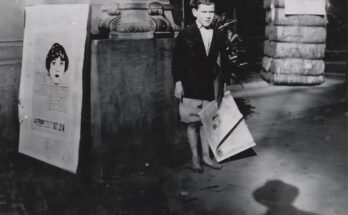Leibusch Fischelberg was born on 28 May 1899 in the small town of Brzesko, located in what was then the Austro-Hungarian Empire and is now southern Poland. Brzesko was home to a vibrant Jewish community that had existed for centuries, with Jewish life deeply woven into the cultural and economic fabric of the town. Leibusch grew up in a world shaped by tradition and hardship, where Jewish customs, family ties, and communal support formed the cornerstone of daily life. He was born into a time of political upheaval and national aspirations, with Poland yet to regain independence after being partitioned for more than a century.
As a young man, Leibusch learned the trade of tailoring—an honorable and skilled profession that provided a livelihood for many Jewish families across Eastern Europe. Tailors like Leibusch were essential to their communities, producing clothing by hand and offering services that blended practical necessity with a touch of artistry. His work likely brought him into close contact with many people from various walks of life, fostering a sense of connection and familiarity in the town. He may have worked long hours to support his family, navigating the economic uncertainties of interwar Poland.
The years following World War I were tumultuous, with the rebirth of the Polish state in 1918 and the challenges of building a new national identity amid rising antisemitism. For Jews like Leibusch, daily life became increasingly difficult, as discriminatory policies and societal hostility created an atmosphere of exclusion. Despite these challenges, Leibusch continued his life in Brzesko, likely nurturing a quiet resilience forged through years of perseverance. He would have been in his early forties when Nazi Germany invaded Poland in September 1939, beginning a brutal occupation that would soon engulf Brzesko and its Jewish population in terror.
Under German occupation, the Jews of Brzesko were subjected to persecution, forced labor, and humiliation. Jewish businesses were shut down or expropriated, synagogues were desecrated, and basic rights were stripped away. Ghettos were established, and families were torn apart by deportations and violence. In this environment of mounting fear and uncertainty, Leibusch was arrested and deported to the Auschwitz concentration camp. He arrived on 24 February 1942, assigned prisoner number 25204. At the time of his deportation, Auschwitz was increasingly becoming a central site of Nazi mass murder and exploitation.
Life in Auschwitz was marked by starvation, disease, inhumane treatment, and forced labor. As a tailor, Leibusch might have been forced to use his skills to serve the needs of the SS or other prisoners, mending or making uniforms. However, the relentless brutality of the camp system made survival extremely difficult, especially for those who were weakened, ill, or simply unlucky. Prisoners were reduced to numbers, stripped of identity, and subjected to constant psychological and physical abuse. The life expectancy for new arrivals was tragically short, especially in the early months of 1942, when mass executions and brutal conditions prevailed.
Leibusch Fischelberg perished in Auschwitz on 17 April 1942, less than two months after his arrival. The exact cause of his death is unknown, as with so many others who vanished in the machinery of the Holocaust. He was just 42 years old. His passing is a stark reminder of the countless lives—rich with promise, family, and human dignity—that were extinguished during the Holocaust. His death, like that of millions of other victims, leaves a void in the tapestry of human history that can never be fully comprehended or healed.
Remembering Leibusch Fischelberg is more than a gesture of historical record—it is an act of moral responsibility. Each individual life lost in the Holocaust represents a universe of experience, dreams, and relationships. By telling his story, we honor not only his memory but also the humanity that the Nazis sought to destroy. His name and life serve as a solemn beacon, reminding future generations of the horrors of hatred and the necessity of preserving human dignity in the face of oppression.


